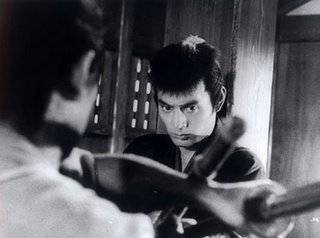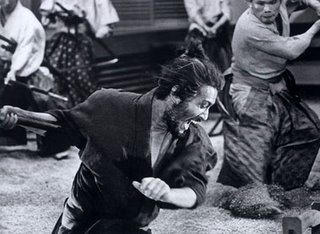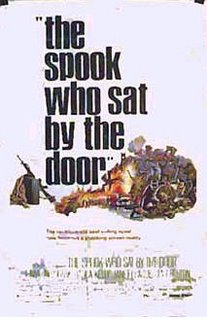Recent Highlights: Samurai, Spooks, and Catching Up with 2005
Considering how few and far between the updates have been lately, how about turning this blog into a sloppy capsule/screening log, sort of like a WHYSL* round-up? Say, once or twice a month? Why not indeed.
* What Have You Seen Lately?
 On and off through September and October I've been cultivating my near-embarrassing knowledge of Asian movies, both old and new. In particular, I've seen a hefty bunch of samurai flicks, most notably Okamoto's Samurai Assassin [mixed] (1965) and The Sword of Doom [PRO] (1966), and Kobayashi's Samurai Rebellion [pro] (1967) and Harakiri [PRO-] (1962). Of the four, The Sword of Doom stands out as a defiant, wild masterpiece, but its cynical-bordering-on-nihilist outlook on life, society and the world around us may not be to everyone's liking. The charismatic Tatsuya Nakadai stars as a samurai with a seriously dark streak, doomed to bring death and destruction not only to his enemies, but also his allies, friends and loved ones - but no matter how much he recklessly puts his own life on the line and tries to give up, his fate just doesn't let him break the chain of violence brought on by his sword and direct it against himself. Nakadai's psychotic performance is the highlight of the movie. Ends with a memorable mid-action freeze-frame, not unlike Truffaut's The 400 Blows (but under slightly different circumstances).
On and off through September and October I've been cultivating my near-embarrassing knowledge of Asian movies, both old and new. In particular, I've seen a hefty bunch of samurai flicks, most notably Okamoto's Samurai Assassin [mixed] (1965) and The Sword of Doom [PRO] (1966), and Kobayashi's Samurai Rebellion [pro] (1967) and Harakiri [PRO-] (1962). Of the four, The Sword of Doom stands out as a defiant, wild masterpiece, but its cynical-bordering-on-nihilist outlook on life, society and the world around us may not be to everyone's liking. The charismatic Tatsuya Nakadai stars as a samurai with a seriously dark streak, doomed to bring death and destruction not only to his enemies, but also his allies, friends and loved ones - but no matter how much he recklessly puts his own life on the line and tries to give up, his fate just doesn't let him break the chain of violence brought on by his sword and direct it against himself. Nakadai's psychotic performance is the highlight of the movie. Ends with a memorable mid-action freeze-frame, not unlike Truffaut's The 400 Blows (but under slightly different circumstances). The two Kobayashi films are, despite their traditional settings, vicious attacks on the old samurai society; they unmask the rituals and traditions as hipocrisy - rigid frauds only kept alive to maintain the proper power balance between the haves and the have-nots. Both movies caused quite a stir back in the day, especially Harakiri, the better of the two (also starring Nakadai), since up until then all Japanese movies about samurai culture had been rather flattering and respectful - according to many scholars, filmmakers were simply unwilling to critically deal with this arguably flawed culture that still cast a shadow on Japan - while Kobayashi portray many of the closely knit samurai clans as havens of self-interest and cowardice.
The two Kobayashi films are, despite their traditional settings, vicious attacks on the old samurai society; they unmask the rituals and traditions as hipocrisy - rigid frauds only kept alive to maintain the proper power balance between the haves and the have-nots. Both movies caused quite a stir back in the day, especially Harakiri, the better of the two (also starring Nakadai), since up until then all Japanese movies about samurai culture had been rather flattering and respectful - according to many scholars, filmmakers were simply unwilling to critically deal with this arguably flawed culture that still cast a shadow on Japan - while Kobayashi portray many of the closely knit samurai clans as havens of self-interest and cowardice.To connect the past with the present, I also happened to watch Tsui Hark's Cannes '05 opener Seven Swords [mixed] a couple of weeks ago. It's another grand martial arts saga following in the (lucrative) footsteps of Zhang Yimou's recent epics (while quoting several classic martial arts epics in the process), and it's pretty weak for most of its 150 running minutes. Some great art direction, beautiful vistas, and a stunning sword fight between Donnie Yen and Honglei Sun, paying tribute to a similar fight in Once Upon a Time in China II, save the day.
 The Spook Who Sat by the Door (Ivan Dixon, 1973) [pro-] is an odd blaxploitation flick, a satire exposing and exploiting the white man's supposedly ultimate fear - the Intelligent Negro. As a political stunt to boost popularity among the public, the CIA launches a drive to enlist more African-American agents into the organization. Out of many applicants, Dan Freeman (Lawrence Cook) emerges as the most qualified: a well-educated, thorough pencilhead with a black belt in karate. Graduating with top honors, he is presented to the brass as the token black guy, only to get pushed down the ladder when the hype has died down. Stuck with a demeaning deskjob, Freeman quits the agency, returns to the ghetto, and starts up a Black Panther-like militia, hellbent on overthrowing the Man. Despite its narrative ups and downs, the film gains a lot by employing a much larger perspective on society than most blaxploitation films of the era, commenting on racism and injustice not through the eyes of a single hoodlum or pimp, but by literally starting a revolution, culminating in a bizarre, outrageous finale where the militia men are fighting the US army.
The Spook Who Sat by the Door (Ivan Dixon, 1973) [pro-] is an odd blaxploitation flick, a satire exposing and exploiting the white man's supposedly ultimate fear - the Intelligent Negro. As a political stunt to boost popularity among the public, the CIA launches a drive to enlist more African-American agents into the organization. Out of many applicants, Dan Freeman (Lawrence Cook) emerges as the most qualified: a well-educated, thorough pencilhead with a black belt in karate. Graduating with top honors, he is presented to the brass as the token black guy, only to get pushed down the ladder when the hype has died down. Stuck with a demeaning deskjob, Freeman quits the agency, returns to the ghetto, and starts up a Black Panther-like militia, hellbent on overthrowing the Man. Despite its narrative ups and downs, the film gains a lot by employing a much larger perspective on society than most blaxploitation films of the era, commenting on racism and injustice not through the eyes of a single hoodlum or pimp, but by literally starting a revolution, culminating in a bizarre, outrageous finale where the militia men are fighting the US army.I have now seen about 55 films that, according to IMDb, were released in 2005. An average year - lots of crap, some good stuff. Like any other year. Biggest disappointments so far are Michael Haneke's Caché [mixed-] and David Cronenberg's A History of Violence [mixed-] (I can see myself lowering both to con). Caché is shallow arthouse fluff parading as tense thriller, it wants to be both a nailbiting piece of dread and a critique of the bourgeois society's tendency to forget its past (in this case France's treatment of the Algier crisis) - and it fails in both respects. Apart from the dependable Daniel Auteuil and Juliette Binoche, and some nice static camera shots, it's barely interesting. Predictably, it was loved to death upon its release here some weeks ago. One critic said it best: "I don't understand one bit - it's great!". That's the spirit.
A History of Violence is another beast. Though mildly entertaining - certainly not as frustrating and, yes, boring as Caché - it left me with the feeling of "that's it?", more than anything else. Something about it just doesn't gel; everything is slightly off, from the awkward high school scenes to the sudden acceleration of the narrative - and then it's all over, in about 95 minutes. I realize that Cronenberg might be adopting some sort of ironic or distanced position here, I've read comments about how he perhaps directed some scenes badly "on purpose" to hammer home a point, but that just sounds like apologetic auteurism nonsense. And what point, exactly? Apart from the "violence is not a good thing" sentiment, I have trouble finding any subtext. As someone wiser than me said, "for a film that doesn't want to be taken at face value, it's pretty easy to take it at face value".